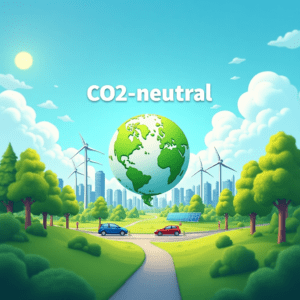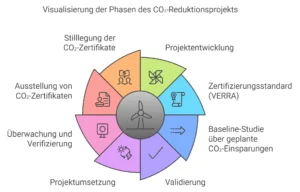CO₂-neutral means that a process, a product, a person, or an organization does not release net carbon dioxide emissions into the atmosphere over a certain period of time. This is achieved by either reducing the amount of CO₂ emitted or offsetting it through measures that bind the greenhouse gas, such as reforestation or investments in renewable energy. The concept of CO₂ neutrality is a central approach in the fight against climate change, as it aims to reduce greenhouse gas emissions to a level that limits global warming to a maximum of 1.5°C above pre-industrial levels.
The paths to CO₂ neutrality can be roughly divided into two categories:
1. Reduction of Emissions:
This includes measures such as switching to renewable energy sources (e.g., solar and wind energy), improving energy efficiency, and transitioning to less environmentally harmful technologies in production and transportation.
2. Compensation of Emissions:
For emissions that cannot be completely avoided, compensation measures can be taken. This involves planting trees that bind CO₂ from the atmosphere or investing in climate protection projects that save the same amount of CO₂ that is released by one’s own operations.
A CO₂-neutral status is often verified and confirmed through certifications and calculations. Companies that commit to CO₂ neutrality often invest in carbon sequestration projects or support programs in developing countries that promote sustainable energy and environmental protection initiatives.
CO₂ neutrality is an important step towards sustainability and long-term environmental protection. Countries, companies, and individuals are increasingly setting goals to become CO₂-neutral in order to contribute to global emissions reduction.
More details and current developments on the topic can be found in the Wikipedia article on CO₂ neutrality.
You can become CO₂-neutral via werde-co2-neutral.de.



